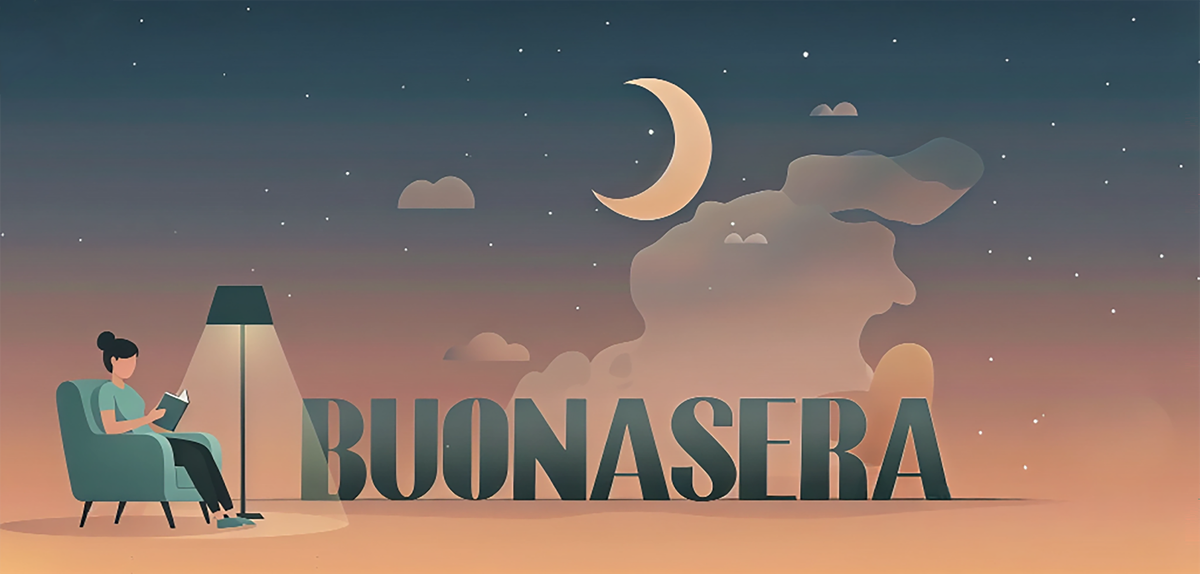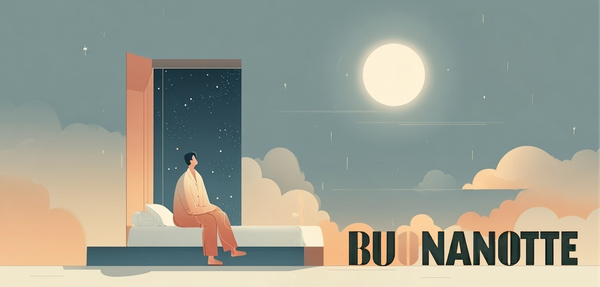Intro.
In Italy, buonasera is a greeting that transforms into a gesture of respect, warmth, and hospitality that accompanies the arrival of evening and the concluding part of the day. It's the greeting you hear when entering a restaurant for dinner, passing a neighbor at sunset, starting a phone call in the late afternoon, or politely addressing someone in formal contexts. With a single word, you mark the transition from day to evening, maintaining the thread of social relationships with politeness and kindness.
From the more formal "buonasera" to the colloquial "sera!", to farewell formulas like "buona serata," the Italian language offers different nuances that change depending on context and intention.
In this in-depth guide, we'll explore together when and how to use "buonasera", its variants, related expressions, and some useful linguistic notes, such as the difference between sera and serata.
Ready? Let's begin... and if you're reading this article at sunset, buonasera to you!
For a complete overview of Italian greetings, we recommend reading our comprehensive guide dedicated to Italian greetings.

1. The Italian Good Evening: Buonasera
Buonasera is the typical greeting of the evening hours, generally used from late afternoon until night. It's an extremely versatile formula, suitable for both informal and more formal contexts: you can say it when entering a shop, greeting colleagues at the end of the workday, or respectfully addressing people you barely know. It can introduce a conversation or accompany a farewell: in the latter case, it expresses a discreet and respectful wish, similar to buona serata but with a more neutral and universal tone.
In everyday language, buonasera maintains an elegant and measured tone, perfect for situations where you want to be courteous without being too distant. In more formal contexts — such as professional environments, official meetings, or with people of greater age or status — it's the preferred greeting, as it conveys respect and good manners.
Buonasera also marks the moment when the pace of the day slows down and the evening atmosphere of conviviality and sharing takes over.
Literally meaning "Good evening", it carries a positive wish that accompanies the last hours of the day.
The closest English equivalent is Good evening.
"Buonasera" is always answered with "Buonasera", maintaining the same register as your interlocutor.
Tone: elegant, courteous, warm.
Examples:
A: Buonasera, ragazzi! Pronti per la partita?
B: Buonasera! Non vediamo l’ora!
A: Good evening, guys! Ready for the match?
B: Good evening! We can’t wait!
A: Buonasera, signora Rossi.
B: Buonasera, dottor Bianchi.
A: Good evening, Mrs. Rossi.
B: Good evening, Dr. Bianchi.
1.1 Sera! - Informal Evening Greeting
"Sera!" is the abbreviated and colloquial version of "buonasera". It's very common in everyday speech, especially among friends. It's quick, spontaneous, and maintains courtesy in a lighter form.
In English, it corresponds to Evening!, with the same informal tone.
"Sera!" can be answered with the same greeting, or with "Ciao!" or "Buonasera!" in a more complete version.
Tone: colloquial, direct, spontaneous.
Examples:
A: Sera, Marco! Sei appena arrivato?
B: Sera, Mary! Sì, da poco!
A: Evening, Marco! Just got here?
B: Evening, Mary! Yes, just arrived!
A: Sera, Francesca! Bella sorpresa trovarti qui.
B: Ciao, Alberto! Non potevo mancare!
A: Evening, Francesca! What a nice surprise to find you here.
B: Hi, Alberto! I couldn’t miss it!
2. How to Use Buonasera: Dire vs Dare
In Italian, you can "dire buonasera" ("say good evening") and "dare la buonasera" ("give good evening"). The first expression simply indicates the linguistic act of saying the word "buonasera"; the second emphasizes the gesture of attention and courtesy directed toward an interlocutor. "Dare la buonasera" is almost like a small verbal gift, a sign of good manners that contributes to creating a more cordial atmosphere.
In English, these correspond to To say good evening (dire "buonasera") and To wish someone good evening (dare la buonasera).
Examples:
Quando entro in un ristorante, dico sempre “buonasera”.
When I enter a restaurant, I always say “good evening.”
Ricordati di dare la buonasera ai nonni.
Remember to wish your grandparents good evening.

3. Buona Serata: Italian Evening Farewell Expression
Buona serata is the most common formula for closing a conversation in the evening hours. Unlike "buonasera", which can introduce or close a meeting with a greeting, "buona serata" adds a real wish: it invites the interlocutor to spend the remaining hours of the evening well.
When the person leaving pronounces the greeting, it's common to add "Buon proseguimento (di serata)" (Have a good continuation of the evening), an expression that emphasizes continuity and makes the wish even more targeted. In this case, the idea is: "I'm leaving, but I wish the rest of your evening continues well". This formula is particularly common in group evenings, when one of the participants says goodbye before the others and wants to wish that the company continues to have fun even without them. However, it's also frequent in formal contexts, for example when a customer leaves a restaurant, office, or event and wants to say goodbye cordially and elegantly.
The English equivalent is Have a nice evening.
"Buona serata" can be answered with a simple thank you, for example "Grazie, anche a te/lei!" (Thanks, you too!), or by reciprocating the wish with "Buona serata anche a te!" (Have a good evening to you too!).
Tone: courteous, warm.
Examples:
A: Grazie per l’aiuto, Luca! Buona serata!
B: Grazie, buona serata anche a te, Sara!
A: Thanks for the help, Luca! Have a good evening!
B: Thanks, have a good evening to you too, Sara!
A: Le auguro una buona serata, signora Pani!
B: Grazie, anche a lei!
A: I wish you a good day, Mrs. Rossi!
B: Thank you, you too!
3.1 Sera vs Serata: Understanding the Difference
To understand the difference between buonasera and buona serata, it's useful to distinguish the terms sera and serata.
The word sera (evening) indicates the moment of the day that goes from sunset until night, in a neutral and temporal sense. It's the word that appears in the greeting "buonasera."
The word serata (evening experience), however, emphasizes the unfolding of the evening hours, their quality and experience. It's the term that appears in the greeting "buona serata". This is why saying "buona serata" conveys a more personal and kind wish, because it recalls the value and quality of the evening hours, whatever way they are lived — whether it's moments of leisure, commitments, or work.
Examples:
Di sera mi piace leggere un libro. (momento preciso)
In the evening I like to read a book. (specific moment)
Abbiamo trascorso una bellissima serata a teatro. (valutazione dell’esperienza)
We spent a wonderful evening at the theater. (evaluation of the experience)

3.2 Bella Serata: Beautiful Evening Expressions in Italian
The word serata is often used also in phrases that express a judgment on the experience lived or a wish directed to someone else.
Here are three very common uses:
• Augurare una bella serata (Wishing a beautiful evening)
This expression shifts attention from personal experience to interaction with the other. It's a well-wishing greeting that shows courtesy and attention, very common both among acquaintances and in professional contexts.
In English, it corresponds to I wish you a good evening or, more commonly, Have a nice evening.
This expression is usually answered by reciprocating the wish, with phrases like "Grazie, anche a te" (Thanks, you too) or "Grazie, altrettanto" (Thanks, same to you), maintaining the same cordial and kind tone.
Tone: courteous, warm.
Examples:
A: Grazie per la disponibilità, ti auguro una buona serata.
B: Grazie, anche a te!
A: Thanks for your availability, I wish you a good evening.
B: Thanks, you too!
A: La ringrazio per il tempo che mi ha dedicato. Le auguro una buona serata.
B: Grazie, altrettanto!
A: Thank you for the time you’ve given me. I wish you a good evening.
B: Thank you, same to you!
• Trascorrere una bella serata / delle belle serate (Spending a beautiful evening / beautiful evenings)
Saying "Ho trascorso una bella serata" (I spent a beautiful evening) describes a positive perception of the evening hours spent, linked to pleasant moments, successful meetings, or relaxing atmospheres. "Belle serate" (Beautiful evenings) extends this meaning to more occasions.
In English, this expression corresponds to It was a nice evening or It was a lovely evening.
Tone: positive, descriptive.
Examples:
Abbiamo trascorso una bella serata in vostra compagnia.
It was a lovely evening with you.
Abbiamo trascorso belle serate tra musica e risate.
We’ve spent lovely evenings filled with music and laughter.
3.2.1 Types of Evening Events
In Italian, the word serata can take on different nuances depending on the context. Beyond the simple reference to the evening period, it's often used to indicate events or particular occasions, each with a specific atmosphere and meaning.
• Serata di gala (Gala evening)
Indicates an elegant or charity event, characterized by formal attire, live music, awards, or fundraising. It's synonymous with refinement and celebration.
Example:
Il festival si è concluso con una serata di gala.
The festival ended with a gala evening.
• Serata inaugurale / conclusiva (Opening/closing night)
Used to indicate the opening or closing evening of an event, such as a festival, exhibition, or show. These moments represent respectively the official beginning and the final celebration of the event.
Example:
La serata inaugurale del festival è stata un successo.
The opening night of the festival was a success.
• Serata a tema (Themed evening)
Describes an event organized around a specific topic, style, or culture. It could be a Mexican evening, 80s theme, literary, or culinary event. The distinctive element is the thematic coherence of music, clothing, decorations, or menu.
Example:
Abbiamo partecipato a una serata a tema medievale con costumi e musica d’epoca.
We took part in a medieval-themed event with costumes and period music.
• Serata danzante / musicale / teatrale (Dancing/musical/theatrical evening)
These are typical expressions from posters and cultural announcements, indicating events dedicated to artistic entertainment. The "serata danzante" (dancing evening) focuses on dancing, the "musicale" (musical) on performances by singers or groups, while the "teatrale" (theatrical) is linked to theatrical performances.
Example:
Domani al circolo ci sarà una serata musicale con artisti locali.
Tomorrow there will be a musical evening with local artists at the club.
4. Italian Idioms with Serata: Evening Expressions
The word serata appears in greetings and in various Italian idiomatic expressions used to describe situations, experiences, or atmospheres connected to the evening hours.
Here are two of the most common ones:
• Fare serata (Going out for the evening)
"Fare serata" is a colloquial and youthful expression that means going out and having fun, spending time in company until late. It's linked to the idea of sociality, leisure, and vitality typical of evening hours. In more informal contexts, it can also be used with ironic or playful nuances.
Small grammatical note: in this expression, the verb "fare" (to do/make) is conjugated normally in different tenses and persons — "Ho fatto serata" (I went out for the evening), "Facciamo serata" (We're going out for the evening), "Farò serata" (I'll go out for the evening), etc. — but can also appear in the infinitive, as in "Mi piace fare serata!" (I like going out for the evening!) or "Non vedo l'ora di fare serata con voi!" (I can't wait to go out for the evening with you!).
Example:
Stasera facciamo serata in centro!
Tonight we’re going out for the evening!
In some Italian regions, the expression also connects to "Tirare mattina" (Staying awake until dawn), meaning staying awake until dawn.
• Serata da lupi (Wolf evening/Dreadful evening)
This phrase describes an evening of bad weather, cold, windy, or stormy. It's a figurative way to evoke harsh atmospheric conditions, in which one would prefer to stay warm at home.
Example:
Con questo vento, che serata da lupi!
With this wind, what a dreadful night!
The image of "lupi" (wolves) recalls the idea of wild and threatening nature and at the same time also a certain mysterious charm of stormy nights.
Conclusion
Buonasera is a greeting that accompanies the second part of the day with elegance and warmth. From the more neutral "Buonasera" to the abbreviated "Sera!", to the well-wishing farewell "Buona serata," it encompasses a way of acknowledging the other and wishing them something positive.
Using these formulas naturally means grasping an important nuance of Italian culture: attention to shared moments, even in the simplest gestures.
And so, buonasera to you or... buona serata!

Adriana Rossi is a certified teacher of Italian as a foreign language from Rome, Italy, and has been part of the Giulia team since 2024. With a Modern Literature degree and advanced studies in Modern Philology, she specializes in tracing the origins and evolution of Italian words, bringing expertise in diction and expressive reading to help preserve and share Italy’s linguistic heritage with learners worldwide.





